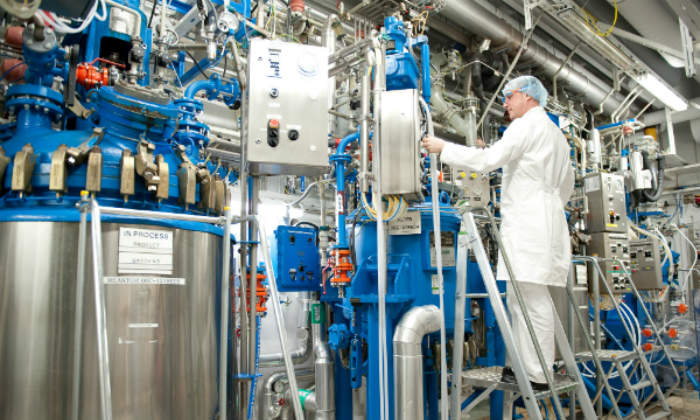Streamlining Peptide Process Development for Large-Scale Manufacturing

The development of peptide processes for large-scale manufacturing has emerged as a groundbreaking advancement within the pharmaceutical industry. As demand for innovative medical treatments grows, harnessing technologies such as advanced peptide synthesis becomes critical. This approach transforms the production landscape by facilitating efficient scalability and fostering new possibilities in drug development. These innovations make peptides increasingly accessible, heralding a new era of medical treatments characterized by precision and efficacy.
As the global demand for peptides rises—driven by their transformative potential in novel therapies—it’s imperative to streamline manufacturing processes to meet this demand effectively. Employing advanced technologies and methodologies is pivotal in enhancing production efficiency and scalability. By leveraging these strategies, the pharmaceutical industry stands ready to meet growing therapeutic needs while embracing a surge of innovation in peptide-based solutions.
Introduction to Peptide Manufacturing
The Importance of Peptides
Peptides are central in numerous biological processes, serving as key regulators and effectors within the human body. Their therapeutic potential is vast, spanning various applications from metabolic disorder treatments to powerful anti-cancer agents. This specificity and efficacy render them ideal candidates for targeted therapies, facilitating advances in personalized medicine that promise better patient outcomes. As their potential expands, the necessity for efficient peptide production becomes even more apparent, enabling broader application in diverse medical fields.
Challenges in Large-Scale Production
While peptides hold significant promise, scaling their production comes with challenges that must be overcome. The complexity of maintaining purity, yield, and stability on a large scale makes production a meticulous endeavor. Overcoming these challenges is essential for making peptide-based therapies economically viable and ensuring they remain accessible to a broader audience. Addressing these production issues can unlock the full potential of peptides, driving further advancements in pharmaceutical treatments.
Techniques to Enhance Peptide Manufacturing
Innovations in Synthesis Technology
The field of peptide synthesis technology has witnessed significant advancements, significantly enhancing the capability to construct complex peptide chains with precision. Innovations, including solid-phase peptide synthesis (SPPS) and solution-phase methods, have made high-throughput production feasible, reducing costs and increasing the accessibility of peptide therapies. These methods enable the efficient and reproducible synthesis of peptide molecules, allowing researchers to explore a broader spectrum of possibilities in drug development and therapeutic applications.
Automation and Efficiency
Automation in peptide synthesis marks a significant leap forward in the quest for operational efficiency, streamlining production, and ensuring reproducibility. Implementing automated systems reduces the manual burden on scientists, increasing throughput and consistency across production batches. By leveraging robotic systems, manufacturers can achieve greater efficiency and precision in handling complex synthesis processes, leading to more reliable and higher-quality peptide products. This level of automation also speeds up the development timeframe, allowing new therapies to reach the market more quickly.
Scaling Up: From Small-Scale to Industrial Production
The Transition Process
Transitioning peptide production from a small laboratory scale to an industrial level is a complex process that involves adapting existing methodologies to accommodate increased volume while maintaining quality. This transition entails optimizing reaction conditions, refining purification methods, and adjusting process parameters to handle larger batches without sacrificing the quality and purity of the final product. The success of this transition is crucial to expanding the reach of peptide-based treatments to a global audience, meeting the growing demand for effective therapeutic solutions.
Role of Process Development
Process development plays a critical role in the successful scale-up of peptide manufacturing. It involves extensive research and testing to predict and mitigate potential challenges in large-scale production. This process includes integrating advanced analytical tools and feedback systems that monitor production parameters in real time, ensuring that high standards of quality and consistency are maintained throughout the manufacturing cycle. Such comprehensive development efforts are essential for achieving reliable and cost-effective peptide production at scale.
Key Technologies Facilitating Large-Scale Manufacturing
Bioinformatics and Data Analytics
Incorporating bioinformatics and data analytics within peptide manufacturing can vastly improve the efficiency and precision of synthesis processes. Researchers can predict peptide characteristics and behaviors by analyzing vast datasets, streamlining the design and execution of new projects. Bioinformatics advancements provide key insights into optimizing peptide synthesis strategies, facilitating the development of highly targeted and effective peptide therapies that meet specific medical needs. This integration of data analytics advancements is revolutionizing the field, driving innovation and efficiency in peptide production.
Green Chemistry Practices
Adopting environmentally friendly practices in peptide manufacturing is becoming increasingly important to minimize the ecological impact of large-scale operations. Green chemistry techniques aim to create sustainable processes by reducing waste and utilizing non-toxic reagents. These practices yield both environmental benefits and improved cost-efficiency, ultimately enhancing the sustainability and competitiveness of peptide production. As the industry moves towards more sustainable practices, the environmental footprint of peptide manufacturing will continue to decrease, aligning with global efforts to reduce environmental impact and create a greener future.
Future Prospects of Peptide Manufacturing
Integration with Cutting-Edge Technologies
The future of peptide manufacturing holds immense promise with the integration of cutting-edge technologies such as artificial intelligence and machine learning. These technologies offer powerful predictive insights and optimization techniques that can transform how peptides are produced and refined. By employing AI-driven analytics, manufacturers can streamline processes, enhance efficiencies, and develop new peptide-based treatments more rapidly. As these technologies continue to evolve, they promise to drive a new wave of innovation and advancement in the peptide manufacturing sector.
Sustainable Growth and Global Accessibility
With streamlined production processes, the potential for sustainable growth within the peptide industry is enormous. Increasing global accessibility to peptide treatments relies on ongoing commitment to innovation and efficiency in production practices. By improving manufacturing processes, lowering costs, and expanding access to peptide therapies, the industry can deliver cutting-edge treatments to those who need them most. This focus on sustainability and accessibility ensures that peptide-based solutions remain at the forefront of global healthcare, offering hope and improved patient outcomes worldwide.
Conclusion
The Evolution of Peptide Manufacturing
As the demand for peptide-based therapies continues to rise, the importance of effective and scalable manufacturing practices has never been greater. By harnessing innovative technologies, embracing automation and sustainable practices, the peptide industry is poised for significant transformation. As these efforts progress, the ultimate goal remains clear—delivering effective, affordable, and accessible treatments worldwide, thus revolutionizing modern medicine and improving countless lives.




